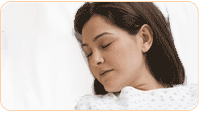Many women find it increasingly difficult to get a good night's sleep when going through menopause. Researchers have found that a leading cause of menopausal sleep disorders is the potentially debilitating disorder sleep apnea.
Many women report sleep disorders during menopause, which can be caused by a variety of problems, such as uncomfortable menopausal symptoms like night sweats. What many women may not know, however, is that one of the leading sleep disorders during middle age is sleep apnea, a condition that causes the constriction or interruption of breathing during sleep, causing women to suffer from less restful sleep and to awaken frequently during the night.

Sleep apnea becomes strikingly more recurrent and more intense in menopausal and postmenopausal women, most likely because of weight gain and as yet not fully understood hormonal actions. New information suggests that progesterone and estrogen hormone therapy may assist in alleviating sleep apnea and in ameliorating overall sleep quality in women going through menopause.
According to a study carried out by Netzer, Eliasson and Strohl, low levels of sex hormones in women are associated with sleep apnea or sleep-disordered breathing. The investigators studied 53 women ranging in age form 24 to 72, measuring their sleep and breathing patterns and hormonal levels (determined from blood samples). They found that women who had the lowest amounts of the hormones progesterone and astradiol had the most acute sleep apnea.
Eichling and Sani conclude that estrogen is a central factor in restful sleep, but other reports have found that progesterone is just as vital a factor. In the report “Effects of progesterone on sleep,” the authors describe progesterone as a hormone that plays an important role in several bodily processes, including sleep quality and respiration. The hormone has a sedative affect and strongly stimulates respiration.
Women who are experiencing low progesterone levels due to menopause may want to discuss a form of estrogen or progesterone therapy with their doctors in order to improve their sleeping patterns.